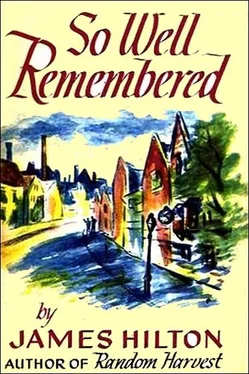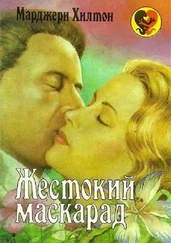Джеймс Хилтон - So Well Remembered
Здесь есть возможность читать онлайн «Джеймс Хилтон - So Well Remembered» весь текст электронной книги совершенно бесплатно (целиком полную версию без сокращений). В некоторых случаях можно слушать аудио, скачать через торрент в формате fb2 и присутствует краткое содержание. Год выпуска: 1945, Жанр: Проза, на английском языке. Описание произведения, (предисловие) а так же отзывы посетителей доступны на портале библиотеки ЛибКат.
- Название:So Well Remembered
- Автор:
- Жанр:
- Год:1945
- ISBN:нет данных
- Рейтинг книги:5 / 5. Голосов: 1
-
Избранное:Добавить в избранное
- Отзывы:
-
Ваша оценка:
- 100
- 1
- 2
- 3
- 4
- 5
So Well Remembered: краткое содержание, описание и аннотация
Предлагаем к чтению аннотацию, описание, краткое содержание или предисловие (зависит от того, что написал сам автор книги «So Well Remembered»). Если вы не нашли необходимую информацию о книге — напишите в комментариях, мы постараемся отыскать её.
So Well Remembered — читать онлайн бесплатно полную книгу (весь текст) целиком
Ниже представлен текст книги, разбитый по страницам. Система сохранения места последней прочитанной страницы, позволяет с удобством читать онлайн бесплатно книгу «So Well Remembered», без необходимости каждый раз заново искать на чём Вы остановились. Поставьте закладку, и сможете в любой момент перейти на страницу, на которой закончили чтение.
Интервал:
Закладка:
But now, walking after her into the kitchen, his spirits rose, crowning the physical ease that came over him as he entered the warm small room and sat at the scrubbed table between the gas-stove and the meat-safe. A curious half-painful happiness clutched at him as he watched her across the table-top; she was, he had to admit, as sheerly fascinating to him as ever, with those dark, almost violet-blue eyes that glowed rather than sparkled and gave her whole face a rapt, almost mystic expression; the hair so straw- pale that it could look white against mere gold, the mouth too big for the nose, but the nose so small and perfect that he had sometimes thought that if he were a sculptor he would model it and stick it on a model of someone else’s face—yet he had never found that more matching face, and doubtless never would.
She was talking—most unusually for her—about events of the day, conditions in Europe, and how interesting it must be to visit foreign countries now that the basic comforts of peace-time travel had begun to return.
“Aye,” he agreed. “I’ll bet it’s interesting. I’ve got a book about post-war Europe if you’d like to—”
“Oh, I don’t mean BOOKS, George. It isn’t here where you can understand things always”—and she touched her head—“it’s more like THIS—” and he expected her to touch her heart, but instead she put up her small fist and shook it in his face, laughing meanwhile. “Oh, George —you and your books and meetings and speeches…”
He did not mind the mockery he was accustomed to, especially as she seemed so happy over it. She went on chattering till the meal was ended; then, as they left the kitchen for Annie to wash up, he said—and it was the truth: “Livia, that’s the best lamb stew I ever tasted. How about a cup of tea with me in the study before I get down to some work?”
“You’ve got work to do tonight?”
“Aye—just a bit to finish up. The Education Committee meets tomorrow and I’ve got to hammer at them again for that new school.”
She accompanied him to the study and presently Annie brought in tea. He was so happy, sitting there with her, in his own room with the books in it, and with her own garden below the window outside. And suddenly, as if to signalize the height of his content, the vagrant thought came to him that this was the moment, if a man were a smoker, to light up a pipe, or a cigar, or a cigarette. He laughed to himself at the notion, and then had to tell her what he had been laughing at.
“Well, why don’t you?” she asked. “I’ve got some cigarettes.”
“Nay… I was only joking, Livia.”
“But George, if you WANT to—”
“I don’t want to—it was just that now would be the time if I ever did want to.”
And then he saw her face cloud over as if something in his words had sent her into a new mood. She went to the window, stared out over the dark garden for a moment, then turned round and said very quietly: “Now’s the time for me too. George, I want to leave you.”
“WHAT?” The happiness—so passing, so brief—drained away from mind and body, so that he felt older by years within seconds. “Livia… WHAT? WHAT’S THAT?”
“I—I MUST leave you, George.”
“But, Livia—WHY—what on earth—” He was on his feet and crossing the room towards her.
“No, George—don’t—don’t… Or you can if you like— I don’t mind. It isn’t that I’ve changed in how I feel toward you. And there’s nobody else… but I’m not happy, George, since Martin died.”
“Livia—my little Livia—neither am I—you know that —but after all—” And then he could only add:
“I thought you DID look happy tonight.”
“That’s because I’d made up my mind.”
“To do what?”
“To leave you, George.”
Then she went into further details. It seemed that years before (and he had never known this) she had been to some school in Geneva and had made friends with local people there; she had lately been in correspondence with them and they had asked her to visit them and stay as long as she liked. So she had accepted.
“But…” And even amidst his unhappiness the germ of optimism began to sprout. “But, Livia—that’s another matter altogether! You have friends in Geneva, so you want to spend a holiday with them! Well—why not, for heaven’s sake?” And he began to laugh. “My little Livia’— what a dramatic way of putting it—that you’re going to LEAVE me! Of course you are—for as long as you like—I daresay you DO need a holiday—I’d come with you if I could spare the time—but as you know, I can’t. I don’t mind you going at all—or rather, I don’t mind so much, because although I’ll miss you I’ll be happy knowing you’re having such a good time.”
“I may not have a good time, George.”
“Of course you will, and when you’ve had enough of it you’ll come back to smoky old Browdley like a new woman. I’ll take care of things here while you’re away—I’ll look after Becky—”
“Oh no, I’ll take Becky with me.”
“You will?… All right, if you want. Anything you want… You’re run down, Livia—a holiday’s just what you need—I’m sure a doctor would say so. And don’t worry about money—I’ll go to the bank tomorrow and see if there’s a bit extra I can find for you…”
“Thank you, George, but I have enough… And now I know you want to work.”
“I did want to, but I don’t know as I’ll do much after this. When— when are you going to go?”
“Tomorrow. I have all the tickets and things and I’m pretty nearly packed.”
“Oh, Livia, LIVIA…” And for a moment the battle was on again between despair and optimism, the latter winning by a hairline in the end. “All right, Livia—all right.”
“Good night, George. Please do your work. Please.” And she ran out of the room.
A little later, when he went up to bed, she was asleep. He smiled gently and with relief as he saw her thus, for he had already schooled and drilled his optimism, and that she could sleep so soon, as calmly as a child, was reassurance to all his hopes; while into his bones, as he watched her quiet breathing through slightly parted lips, there came an ache of pity for her —as if in sleep she told the plain wordless truth, that it was not in his power to make her happy enough. She was so small, so mysterious, and to him a part of something so incurable that he wondered, watching her in the light that came in from a street lamp, what would have happened had he been a shade less eloquent at that Council meeting three years earlier—if, for instance, the voting had been seventeen to fifteen AGAINST the motion instead of FOR it? Why, then, so far as he could see, he would never have met Livia at all. And he would have taken that second examination according to plan and have obtained his university degree. And possibly also he would have won the by-election that would have sent him to Parliament as member for Browdley. And also he would not have known such happiness, or such unhappiness either…
“My little Livia,” he whispered, stooping to touch her forehead with his lips. He knew she would not wake.
The next morning she left. He travelled also as far as Mulcaster, shepherding her and her luggage and her dog during that first stage of the journey, and fending off all sad thoughts by the resolute pretence that it was just a holiday. He was disappointed when a friend and fellow-councillor entered the same compartment at Browdley Station; it was hard to concentrate upon a discussion of local political news, but then, later on, he thought it was probably easier than to have made conversation with Livia. She sat cosily, almost demurely, in a corner by the window, staring with quiet interest upon the familiar scenes. The hour-long journey, with stops at every station, built up in George a certain resignation, so that when the train reached the terminus he was well able to take command of the situation when Councillor Ridyard noticed the luggage. “Why, what’s all this?” Ridyard exclaimed, reading the labels. “GENEVA? Who’s going to Geneva?”
Читать дальшеИнтервал:
Закладка:
Похожие книги на «So Well Remembered»
Представляем Вашему вниманию похожие книги на «So Well Remembered» списком для выбора. Мы отобрали схожую по названию и смыслу литературу в надежде предоставить читателям больше вариантов отыскать новые, интересные, ещё непрочитанные произведения.
Обсуждение, отзывы о книге «So Well Remembered» и просто собственные мнения читателей. Оставьте ваши комментарии, напишите, что Вы думаете о произведении, его смысле или главных героях. Укажите что конкретно понравилось, а что нет, и почему Вы так считаете.










